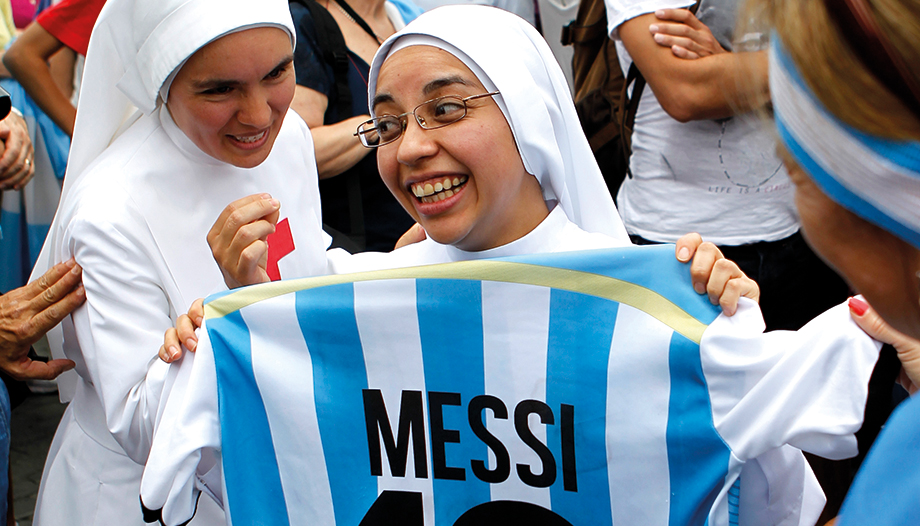The Olympic Games of antiquity had a certain religious character, since they were consecrated to Zeus. They began to be held in 776 B.C. in the city of Olympia, where the main sanctuary dedicated to this god was located. It was a celebration that took place every four years and lasted six days. On the occasion of this event, the different Greek cities enacted a truce: the Olympic peace. In this way, athletes could go to Olympia to participate in the games and return to their cities in peace. In this sense, it can be said that peace and harmony among peoples and men are at the origin of the Olympic spirit.
Religious expressions in sports
The International Olympic Committee has maintained a policy of political and religious neutrality at the Olympic Games, seeking to foster an atmosphere of unity and respect among athletes of different cultures and beliefs.
According to the Olympic Charter, the document that governs the principles and rules of the Olympic movement, any form of political, religious or racial demonstration or propaganda is prohibited at Olympic events.
This prohibition has been interpreted flexibly, as athletes may wear personal religious symbols, as long as they are not displayed in a provocative or excessive manner.
In May 2017, at the 67th FIFA Congress, held in Bahrain, the Muslim, Mohama Alarefe, from the King Saud Muslim University in Riyadh, used the event to demand that FIFA sanction soccer players who make the sign of the cross, because it is a gesture - he said in a message - that offends to their religion.
Alarefe invoked the Federation's regulations to argue that the sign of the cross violated the spirit of the rule by displaying a religious inscription. However, there are many footballers who put their faith first and continue to cross themselves at the start of matches or invoke God when they score a goal.
It is noteworthy that the song Waka Waka ("This is Africa") by Shakira, which served as the official FIFA song for the 2010 World Cup in South Africa, says in one of its verses: "Hear your God and you won't be alone / You came here to shine and you have it all / [...] you have to start from scratch / to touch the sky.".
As is well known, on that occasion Spain lifted the most precious trophy in international soccer for the first time. The song captivated fans around the world. The lyrics allude to the religiosity of the players who become public references on whom the desire of the multitudes to triumph falls and who, in the face of this enormous weight, turn to supernatural help.
Soccer players pray
For their part, the players of the Argentine national soccer team that won the World Cup in Qatar in 2022 sanctified themselves with fervor and devotion before each goal; we all saw Leo Messi, captain of the team, raising his hands to the sky giving thanks to God for what was done on the field.
Angel Di Maria said: "When I put on my T-shirt, I usually start praying. I have my Jesus there, my Virgin, my crucifix and my cell phone with a picture of my wife with the girls. And I always light a candle, but in this final it was the only game of my career in which I didn't pray, I just gave thanks for the moment I was going to live.". When Pope Francis was asked about the message he would send to the Argentine champions in the World Cup, he answered: "Let them live it with humility.".
Perhaps it is worth recalling the example of Sadio Mané. On the occasion of the Ballon d'Or 2022 award ceremony, the magazine France Football The company awarded him with the Socrates Award, created to recognize soccer players with the greatest social action outside the field of play.
Mané said: "What do I want ten Ferrari cars, twenty diamond watches and two airplanes for? What will these objects do for me and for the world? I went hungry, worked in the fields, played barefoot and didn't go to school. Today I can help people. I prefer to build schools and give food or clothes to poor people.".
Away from the flashbulbs, he remains committed to Bambali, the village where he was born. Every time he enters the field of play, Mané bows in the direction of Mecca to bow to Allah. This act of honor to God has as a correlate his activity of commitment to the common good.
In a similar way, it is not strange for a player to sanctify himself, like Keylor Navas, the goalkeeper of the Costa Rican national team, who does not hide his faith and has found the strength he needs in the Catholic religion.
The Pope and soccer
Pope Francis' love of soccer is well known. Before the 2014 World Cup in Brazil he said: "My hope is that, in addition to the days of sports, this World Cup can become a celebration of solidarity among peoples.".
For the Pope, "sport is not only a form of entertainment, but also, and above all, a tool for communicating values, promoting the good of the human person and helping to build a more peaceful and fraternal society.".
On June 1, 2018, the document was presented at the Vatican. Giving the best of oneself. Document on the Christian perspective on sport and the human person.. The very title reveals the essence and reason for the Church's interest in and commitment to sport.
To paraphrase Shakira's song Hear your God and you will not be aloneIt is worth affirming that the experience of faith is a dwelling place that shelters and unites us all, even in sports.











